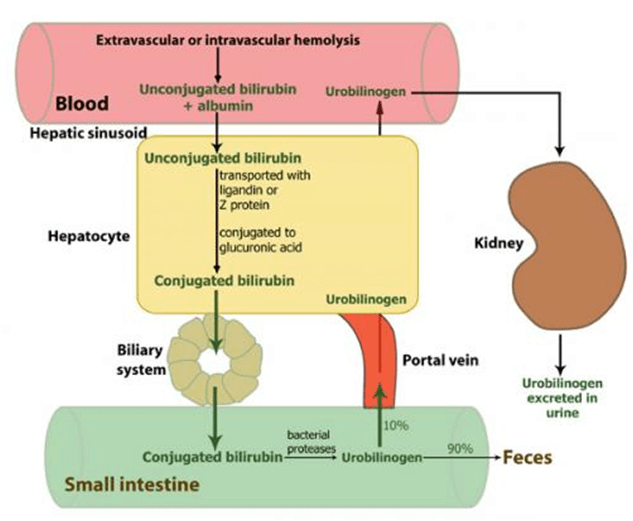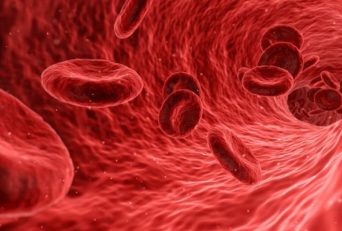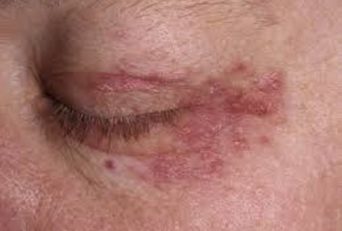Liver diseases are something everyone is afraid of. Because proper functioning of all the parts is dependent on the functioning of the liver. Some of these diseases can be life-threatening and require immediate medical attention.
One such disease is urobilinogen in urine. It can affect people of all age groups. So it is important for you to be aware of all the symptoms and causes of this disease and visit a doctor if necessary.
If you fail to take the tests recommended by your doctors, it can prove to be fatal to your liver.
You can detect this type of damage in the liver by taking urobilinogen tests that measure urobilinogen levels in the urine. Keep reading to find out more about the disease, its causes, treatment, and prevention.
Table of Contents
What Is Urobilinogen?
It appears as a colorless and water-soluble product of bilirubin reduction. It forms in the intestines by bacteria broken down by hemoglobin.
About half of the urobilinogen formed is circulated back to the liver while the remaining half enters circulation and is excreted by the kidney. One of the reasons for excess
One of the reasons for excess hemoglobin breakdown is liver malfunctions. If this happens, more urobilinogen excretes and it may cause severe damage to your system.
If the amount of bilirubin in your urine exceeds a given level, there will be an increase of urobilinogen in the gut. This Urobilinogen is then converted to the yellow pigmented urobilin that you can easily detect the difference in its color.
Causes Of Abnormal Urobilinogen

You can have a high or low level of urobilinogen in your body, depending upon your body type. But changes in those levels indicate a problem and it is advisable that you go for a check-up.
Major Causes Are
1. Medications
If you are in the habit of taking antibiotics for every little ailment, you may have low urobilinogen levels.
These antibiotics kill the natural bacteria that aid in the digestion and absorption of essential nutrients required by your body.
If these drugs interfere with the level of urobilinogen levels in your urine, you can ask your doctor to stop prescribing them or replace them.
2. Liver Cirrhosis
This is another name for liver cancer. When you contract liver cancer, the functioning of the organ weakens.
The level of urobilinogen in your urine becomes abnormal as the liver stops functioning and slowly organ failure occurs.
3. Anemia
If you are suffering from a rare form of anemia known as hemolytic anemia that breaks down red blood cells then it may affect the levels of urobilinogen in your urine.
This is a type of anemia that you usually inherit. The red blood cells can break down in the blood vessels or within other parts of the body.
Symptoms Of Urobilinogen
You can tell if you are suffering from this condition if the color of your urine changes from light color to a dark color and the stool also changes color.
Urobilinogen is the one which gives stools their characteristic dark color. If the urobilinogen levels in your urine completely change or are not present at all, then it usually a sign of a dysfunction of the liver.
When you have this condition your symptoms will match the symptoms of jaundice, since it is an indication of a problem with the functioning of your liver. Many babies experience jaundice during the first week of life due to low bilinogen levels.
Major Symptoms Include
- Yellowing of skin and eyes
- Tiredness
- Abdominal pain
- Nausea
- Fever
- Itchiness
- Weight loss
- Dark urine
- Pale stool
The Different Urobilinogen Levels in Urine
1. Normal Urobilinogen Range In Urine
The normal urobilinogen range should be less than 17 umol/l (< 1mg/dl). If your doctor notices that it is higher or lower than the required range, then he will conduct further tests.
2. Urobilinogen measuring range
The measuring urobilinogen range is 0 – 8 mg/dl or can be anywhere between 0.2 mg/dL to 1.0 mg/dL.
3. Abnormal urobilinogen levels
The change in value may be low as well as high
Two Different Levels Of Urobilinogen In Urine
1. Low Levels Of Urobilinogen
If you find that the levels of urobilinogen in urine are lower in your body, the reason for this is the consumption of antibiotics which affects your intestine. These drugs that are usually prescribed for the antibacterial treatment of jaundice and are high doses of ascorbic acid or ammonium chloride which causes a dip in the level of urinary bilinogen.
2. High Levels Of Urobilinogen
Higher levels of urobilinogen in urine are even more dangerous as it could mean that you are suffering from a disease that is interfering with the normal working of the liver.
Cancer of the liver and liver cirrhosis are some of the diseases that are the reasons for it to increase in the body, and you should get immediate medical attention if that happens.
If your urobilinogen levels are high, there will be an excess breakdown of RBC.
The liver will have to function more and that will cause diseases like a hematoma, liver poisoning, and cirrhosis. The low values suggest blockage of bile ducts and bile production failure.
What Abnormal Urobilinogen Values Indicate
1. High Values
- Excessive breakdown of red blood cells
- Overburdening of liver
- Excess urobilinogen production
- Excess hematoma(re-absorption)
- Liver cirrhosis
- Hepatic infection
- Poisoning of liver
2. Low Values
- Clogged bile passage
- Failure in production of bile
Tests And Diagnosis
There are various test strips available in the market. The strips of P-dimethylamino benzaldehyde are dipped into a sample of urine and the results are then diagnosed. The strips will turn pink if there in a change in the levels of urobilinogen in your urine. If not, it will remain the same.
If the test is positive, further tests should be done to check if you have enough blood cell production in your body. In the case of a prevailing illness, the doctor detects it and treats it before it affects the liver any further.
Preventive Home Remedies For Urobilinogen In Urine
Take the prescribed tests to find out if you are suffering from a change in the level of bilinogen in urine.Once you are sure that you are suffering from this condition, go consult your doctor to get you the best possible treatment for this disease that if not treated, may cause your liver to fail. The reason why the doctor must use the best option is that the ailment must be contained urgently.
If you have low levels of urobilinogen that is a side effect of treatment of another condition, then you should ask your doctor to change your treatment regimen or stop it altogether. This will solve the problem in a short period and the levels will fall back to their proper levels.
How To Lower Bilirubin Levels In Children?
1. Check If Your Child Is Suffering From High Levels Of Bilirubin
If you had a premature birth, then they are more likely to be affected by it as their livers are not completely developed.
Those babies whose blood type cannot work with that of their mothers face this problem. If the baby was born with bruises, the breakdown of red blood cells may increase bilirubin levels.
Babies can develop jaundice if the presence of certain proteins in the mother’s milk or the baby does not receive enough milk, which leads to dehydration.
2. You Can Opt For Phototherapy
Phototherapy is where you expose your infant to blue-green light. These light waves pass through the baby’s body and into the blood and convert the bilirubin into materials that the baby’s body can excrete.You can make the baby wear soft eye patches to protect their eyes from the light.
The baby is likely to have loose, frequent and possibly greenish colored stool as a side effect of phototherapy. This is normal and should end when the treatment of the infant has stopped.
Exposing the baby to direct, natural sunlight can help lower bilirubin levels. You are not advised to see it as a recommended treatment. You can also choose to use a bill blanket, which is a medically advance, fiber-optic based phototherapy treatment.
3. Check The Diet Of The Baby
When your contracts the disease, it is important to check their diet.Doctors recommend them up to 12 times a day if they are down with this condition.Feeding the baby these many times will ensure proper functioning of the liver, which will decrease bilirubin levels.
4. Consult A Doctor As A Final Resort
If none of these remedies seem to work, consult your doctor to discuss further steps and treatments. In such cases, the doctor may even recommend blood transfusions.
How To Lower Bilirubin Levels In Adults?
There a lot of home remedies you could take up, to decrease the urobilinogen levels in urine. They are:
- Avoid food with a lot of fat and oil in it. Try to stay on a light or liquid diet.
- Avoid red meat and other fatty meats that interfere with the digestion cycle.
- Follow a diet that is rich in vitamin C and B.
- Eat sugarcane or drink its juice couple of times a day as it purifies the urine.
- A drink prepared by mixing pure honey, neem juice and black pepper powder and plenty of barley water can be consumed in the morning and evening which will aids digestion.
- Olive oil also helps to lower the bilirubin level.
Other Methods To Reduce Bilirubin Levels
1. Follow A Healthy Diet And Stay Fit
Obesity can damage your liver more than alcohol consumption. Obesity will cause you to have a fatty liver. Even obese children tend to have a fatty liver.
i) Try to include Foods that are high in fibre that is good for the liver, including fruits and vegetables and whole grains in your diet.
ii) Certain foods are more likely to damage the liver.
iii) These include food that is high in fat, sugar, or salt. Other foods that will damage your liver include fried food and raw or seafood and meats cooked in oil.
2. Decrease Your Consumption Of Alcohol
i) Alcohol can most definitely damage your liver and increase bilirubin levels. So limit your consumption to a minimum, depending on your age.
ii) Older people should completely stop consuming alcohol as it can affect their liver more after a certain age.
iii) If the consumption of alcohol is high, it will leave excess fat in liver cells. This condition is known as fatty liver disease. If you are suffering from this condition, you will not experience symptoms, but may experience discomfort and fatigue.
iv) High consumption can also cause scarring and inflammation of the liver and disrupt the functioning of the liver. Some other symptoms may include vomiting, abdominal pain, and fever.
You can identify Cirrhosis of the liver by severe scarring of the liver and your inability to process food and to remove harmful substances from the blood.
3. Prevent Being Affected By Hepatitis
Hepatitis A, B, and C are viruses that can affect your liver. You can make sure that the infants take Hepatitis B vaccination shortly after their birth. You should take Hepatitis A vaccination if you are traveling to or are moving to high-risk areas.
i) If you are traveling to areas of the world that have high rates of hepatitis, get vaccinated before leaving.
ii) Hepatitis can also be contracted through intravenous drug use and unprotected sex.
4. Take Medications Cautiously
Drugs that are prescribed to reduce pain, decrease cholesterol, steroids and other such antibiotics can cause fatal hepatitis.Talk to your doctor to make sure that the medicines you are taking are not harming your liver and consult them before taking alternative medicines.
Some herbs that you are in the habit of consuming, can actually damage your liver.These include green tea, kava, comfrey, mistletoe, Chaparral, and skullcap.
The liver breaks down the medications, and it is possible that they cause damage to your liver during this process. If the high levels of bilinogen in your system are caused by the destruction of red blood cell, you will be required to take iron tablets increase the red blood cell count in your blood.
Make sure to drink at least 8 glasses of water a day. This way you will keep the levels of urobilinogen within the healthy levels recommended by your doctor. You should take utmost care when you are dealing with liver-related disease and you should avoid consuming substances that lead to liver damage.
If your liver is damaged to a great extent, then you should stay in a hospital where you will get strong medical support. In cases where it is too late to save your liver, then you should consider a liver transplant.
Also Read:
Leukocytes In Urine: Causes,Symptoms,Diagnosis & Treatment
White Particles In Urine: Causes, Symptoms, How To Get Rid Of





